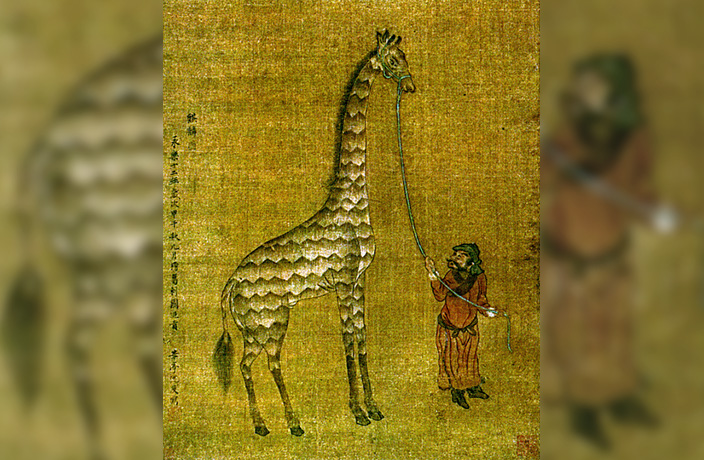Nothing says power like having a pimp selection of pets to impress people. Through the ages, many a Chinese emperor knew the wisdom of this. Here, we take a look at the Middle Kingdom menageries of the great and the good.
Emperor Doolittle
China’s answer to Caligula, the Roman Emperor who infamously made his favorite horse Consul, Gao Wei 高緯 (557–577) of the Northern Qi Dynasty (550-577) raised chickens, eagles, dogs and horses, feeding them with the finest food – far better than the slops he served to his officers – and building them luxury houses.

Gao Wei, he had a thing for horses...
The comparison doesn’t end there; Gao gave his favorite animals official titles and brought them to court to listen to him discuss political affairs, while leaving his human officers at home. Horses seemed to hold a special place in Gao's heart, and he made many a silky saddle for his stable, would prepare their feed personally and set up a ‘bridal chamber’ in which they could mate. He would go along to watch the horses mating, too… as you do.
Ming Qilin
In the early 15th Century the Yongle Emperor 永乐 (1402-1424) sponsored a series of seven naval expeditions to expand Chinese influence. They were commanded by Zheng He 郑和, the eunuch admiral who (only) Gavin Menzies believes made it to America. While in the Kingdom of Bengal, Zheng acquired a pair of giraffes, which had in turn been a gift from an East African ruler.
The animals were sent to the Chinese court, where they were identified with the mythical Qilin, whose arrival, according to Confucian tradition, meant that a sage of the utmost wisdom and benevolence was in their presence, and whose capture signaled the greatness of the emperor’s power.

Qilin Brings Serenity Ode
The beasts inspired a number of poems and paintings, including ‘Qilin Brings Serenity Ode’ by court favorite Shen Du (1357-1434), who also composed a poem about the giraffe in which he concluded, “Gentle is this animal, that has in antiquity been seen but once / The manifestation of its divine spirit rises up to heaven’s abode.” Zheng, meanwhile, sailed to the East African nation of Somalia, where he obtained lions, leopards, ostriches, zebras and other animals which were also viewed with amazement in China.
Macau Lion
When the Qing Dynasty (1644-1912) rulers first conquered China, they still faced resistance from Ming loyalists along the south coast. As Manchus, the Qing were masters of cavalry, archery and steppe warfare, but ill at ease on the water, so dealt with the threat by forbidding almost all maritime trade, as well as evacuating and laying waste to the entire south China coast for 15 kilometers inland.
With the survival of their colony threatened, the Jesuits of Macau pulled out all the stops, and in 1678 managed to bring a lion all the way from Mozambique and deliver it alive to the Kangxi Emperor 康熙帝 (1661-1722) in Beijing.

The Kangxi Emperor
The lion only survived a further 15 days, but by then the emperor had brought his small sons to see it and ordered his court literati to write poetry about it. Subsequent negotiations led to limited legalization of Macau's maritime trade at a time when such trade in Chinese shipping was still technically illegal.
The advantage was short-lived, however – in 1685 the emperor decided to allow trade with all foreign countries; England, Holland, France, Denmark, Sweden, the US and Russia all quickly moved in.
Imperial Pooch
One of the oldest breeds of dog in the world, and one of the least genetically diverged from the wolf, the Pekingese was the favored pet of the imperial court. “Let its forelegs be bent; so that it shall not desire to wander far, or leave the imperial precincts,” said Empress Dowager Cixi 慈禧太后.
It is commonly referred to as the Lion Dog to this day due to its resemblance to Chinese guardian lions. The lion also features in its origin legend – a lion and a marmoset fell in love, so the story goes, but the lion was too large. The lion went to the Buddha and told him of his woes, and the Buddha allowed it to shrink down to the size of the marmoset, the Pekingese being the result.
Having originated from the Buddha, the Pekingese was first a temple dog, and for centuries it could only be owned by members of the imperial palace. But when the Forbidden City fell to British and French troops during the Second Opium War in 1860, Emperor Xianfeng and his court fled to Chengde, while an elderly aunt of his stayed behind.

The Lion Dog
As the ‘foreign devils’ entered the imperial palace, she committed suicide, and was found surrounded by five loyal Pekingese mourning her passing. Lord John Hay took a pair and gave them to his sister, the Duchess of Wellington; Sir George Fitzroy took another pair, and gave them to his cousins, the Duke and Duchess of Richmond and Gordon; while Lieutenant Dunne presented the fifth to Queen Victoria, who named it Looty.
Later, the Empress Dowager Cixi was to present Pekingese to several Americans, including John Pierpont Morgan and Alice Lee Roosevelt Longworth, daughter of Theodore Roosevelt, who named it Manchu. The motivation behind giving the gift remains a mystery though, as she is also on record saying, “Let the Lion Dog comport itself with dignity; let it learn to bite the foreign devils instantly.”
For more history stories, click here.






















0 User Comments